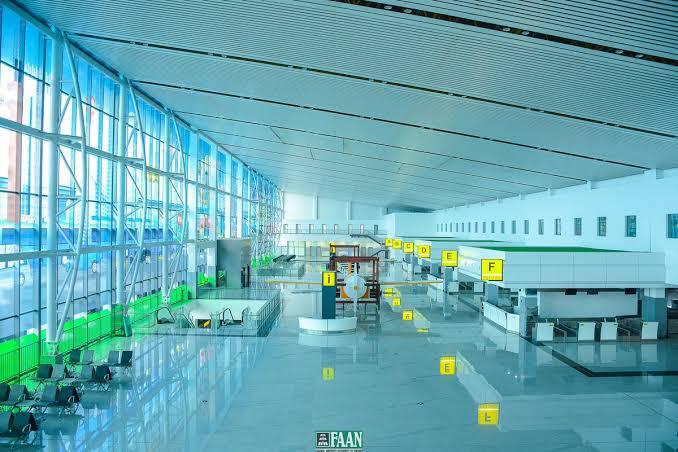
More than two months after SITA withdrew from providing advanced passenger processing, the Federal Airports Authority of Nigeria (FAAN), still conducts manual check-in for travellers. The writer argues that besides causing delays and possible security threats, manual check-in damages Nigeria’s image at a time the world has embraced advanced method of passenger facilitation
Since May 31, 2021 that the SociétéInternationale de Télécommunications Aéronautiques (International Aeronautical Telecommunications Society), known as SITA, withdrew its service from Nigeria due to disagreement with the Federal Airports Authority of Nigeria (FAAN), the agency has failed to secure an alternative service provider despite the assurances that RESA, the Airport Data System, would take over in two weeks.
Before its exit, SITA was providing Common Use Terminal Equipment (CUTE) to airlines that airlift international passengers from Nigeria. CUTE is an IT solution that enables multiple airlines to use existing airport facility to check-in passengers.
Investigations by THISDAY revealed that RESA engineers landed in Nigeria on August 15 to begin the installation of their equipment, which would take a minimum of 30 days.
Meanwhile, passengers and airlines are complaining seriously about the hiccups in passenger facilitation as boarding passes are written manually. This, airline operators said, causes delays, exposes the system to infiltration, which is a major security breach and also hampers accurate recording.
Prolonged Flight Delays
The station manager of a major international carrier at the Murtala Muhammed International Airport (MMIA), Lagos, told THISDAY that airlines that operate international flights from Nigeria were told by FAAN that RESA officials would start installation of their equipment on August 16, noting that installation and migration to the new system would take 30 days. This means that air travellers would suffer the predicament of manual check-in for another one month at least.
“Airlines are not finding it easy. This is a complete mess that passengers are departing this country with manual boarding pass. There is security risk to it because the boarding pass can be pirated.
“It delays passenger facilitation because extra time is spent on check-in. according to the International Air Transport Association (IATA) standard, each passenger should be processed in three minutes but with manual check in, it takes more than six minutes to attend to each passenger. Every airline has its schedule time it would arrive an airport and the time it would depart. It calculates each function, like check-in, security checks for each passenger and boarding. But now this does not happen as airline schedule them because of the manual processing of passengers. You have to write everything manually. Imagine writing boarding pass for 300 passengers.
“Also, the Nigerian Immigration Service personnel are not helping matters because they seem to purposely delay passengers while profiling them. So at the end every airline leaves later that it plans. That is why there is so much delay in departures these days,” the official told THISDAY.
Harrowing Passenger Experience
Passengers have complained that the delay caused by manual check-in was frustrating, forcing them to arrive their destinations later than planned. They complained that the Murtala Muhammed International Airport in particular lacks passenger comfort because there are no seats and no resting bays. That means that when passengers arrive at the departure hall, they have no choice than to stand until they are checked in.
“Since the manual check-in started, passengers wait for four to five hours standing for big airlines that airlift over 200 passengers,” disclosed an official of a private security firm that provides facilitation support to airlines.
The Managing Director of Finchglow Travels and former President of the National Association of Nigeria Travel Agencies (NANTA), Bankole Bernard, who just returned to the country last week, told THISDAY that it was a bad experience travelling out of the country because of the delay caused by manual check-in.
He said that although he checked in online, but so many passengers who flew with him complained bitterly about the delays, noting that it was not a good image for Nigeria as a country.
“Why did we cancel the deal with SITA when we were not ready with the alternative on ground? Many passengers complained bitterly about the delay. This has made life very difficult for passengers. And this is a country that is talking about airport concession. The right thing should be put in place. You must measure up to accepted international standards to be respected and recongised,” he said.
Speaking in the same vein, travel expert and organiser of Akwaaba African Travel Market, Ambassador Ikechi Ukoh, told THISDAY that he did not understand why “there was no plan B before plan A was removed. I cannot apportion blames because I do not have the details of what happened but what we are seeing is shambolic. We don’t know what happened in the contract but passengers have borne the brunt of that decision for over 60 days.”

RESA’s Arrival
A source at FAAN told THISDAY that top officials from the Ministry of Aviation and FAAN, led by the Managing Director of the agency, Captain Hamisu Yadudu, travelled to France to meet RESA and its Nigerian representative, Arlington, to discuss how to hasten the take over of passenger facilitation at the international airports.
The source said the officials left a bit too late after more than two months that passenger processing was done manually.
“Manual processing has security implication. You cannot be sure of your record availability and it can easily be tampered with. That was not a good thing for Nigeria’s reputation. It slows down facilitation but let’s hope that they will install and migrate the system in time to provide service to airlines,” the source said.
Rejection of SITA
THISDAY learnt that FAAN rejected SITA after providing the agency services for over 10 years and chose RESA, represented by Arlington in Nigeria, but as at the time SITA withdrew its services, as was agreed with FAAN, Arlington was not ready to provide unobstructed succession, thus forcing airlines to revert to manual check-in that is fraught with delays.
SITA is a major provider of the CUTE system for passenger processing. Its withdrawal from Nigeria has global ramifications.
“You know that when you are travelling from country A to country B, the destination country should get information of the passenger ahead so that countries like the United State’s Transport Security Administration (TSA) will profile the passenger. If he is a security risk you will not get his boarding pass. Manual check-in is cumbersome and will not allow this to happen in time,” an airline official told THISDAY.
SITA Reneged On Agreement
However, the Managing Director of FAAN, Captain Rabiu Yadudu, told THISDAY recently that SITA was supposed to have continued to provide services till the end of August but the company abruptly shut down its system to paralyse passenger facilitation.
Yadudu acknowledged that the sudden withdrawal of services by SITA led to long queues and delays as airlines resorted to manual check-in but noted that SITA, which reneged on earlier agreement it reached with FAAN, betrayed the agency, which led to the disruption of facilitation.
He explained why FAAN decided to terminate its services with SITA.
“I think the passengers are having the challenge right now because FAAN planned to upgrade and remove the exiting system, which was provided by SITA. It has been in operation for over 10 years. The agreement was due for renewal and SITA did not participate creditably in line with the Nigeria procuring process and they are fully aware. We informed them much earlier of this. However, RESA of France participated and emerged as the only winner of that procurement process. It was all done transparently.
“Towards the end of the contract, SITA requested for six months extension, which will make it easier for SITA to continue to operate. In addition to SITA operating, these self-service kiosks are also available to make sure things are going on as planned. We provided two systems that can be working to make sure things are going on as planned.
“So, by two months into the six months agreement, SITA said they would only do three months. In the last month, they now put a lot of tough conditions, which were not part of the initial agreement. We knew something was amiss,” Captain Yadudu said.
He further explained that SITA was meant to operate till a new organisation took over and even three months after that take over.
“In addition to SITA, we provided a company with self-service kiosks to complement SITA. SITA was supposed to provide self-service kiosk, baggage reconciliation system, CUTE, Traffic Surveillance System (TSS) in Abuja and Lagos. Abuja didn’t have that for the whole tenure of SITA. These were in the contract, but they were never provided by SITA. So, we decided that SITA should be there. FAAN ensured that SITA was still there for the facilitation of passengers and others. FAAN never wanted the ICTS to be the primary service provider if SITA would continue to provide services. We just wanted it to complement SITA, but when SITA pulled out, we decided to use ICTS as stop gap,” he said.
RESA Has Global Pedigree
Captain Yadudu also said that RESA is a world-class company known for the provision of IT and communication solutions, just like SITA.
“Whether you take my word or not, RESA and SITA are the most popular in the world. They do 95 per cent of the service worldwide. There is no question about whether RESA is good or not. As far as we are concerned, we did our due diligence and we were open.
“What is more, we had a contract that cuts across only two airports with SITA; Lagos and Abuja, while FAAN went for a much more comprehensive agreement. We went for five international airports with RESA. To us, it is a much more improvement and we added some services like the baggage reconciliation system and others for 10 years,” he disclosed.
The FAAN boss said the only time the agency owed SITA was during the Coronavirus pandemic, which everyone knew devastated the global economy, especially the air transport sector, adding that passengers comfort and easy facilitation are FAAN’s primary objectives.

“Our primary objective is to ensure that our passengers are safe and protected. Our safety cannot be compromised because of one singular act, but the delay is very unfortunate and we regret it. We can only appeal to our partners to please bear with us,” he said.
However, the General Manager, Corporate Affairs of FAAN, Mrs. Henrietta Yakubu, confirmed to THISDAY that RESA has brought its equipment and has been cleared for the Lagos and Abuja airports.
“The RESA Company the federal government engaged has brought in its equipment. The equipment has been cleared for both MMIA and NAIA. The technical team has started installation,” she said.
But while the installation will take few weeks to complete, passengers and airlines will continue to suffer delays as manual facilitation continues.
THISDAY






